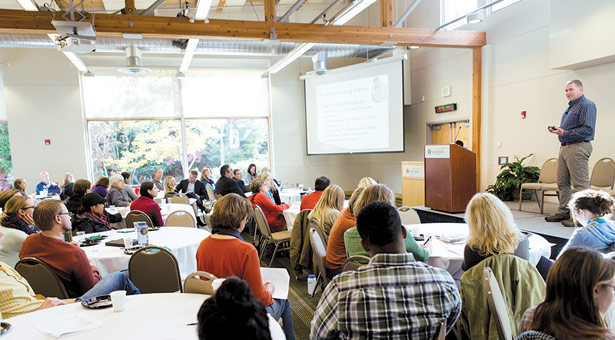Ways to Help a Troubled Teen
Experts Offer Advice for Parents
By Hope McPherson (hmcpherson@spu.edu)| Photo by Daniel Sheehan
 Stephen Mandler of Yellowstone Boys and Girls Ranch speaks in SPU’s Upper Gwinn Commons at a workshop
on helping teens through difficult times.
Stephen Mandler of Yellowstone Boys and Girls Ranch speaks in SPU’s Upper Gwinn Commons at a workshop
on helping teens through difficult times.
When Seattle Pacific University’s School of Psychology, Family, and Community offered the workshop “Helping Teens Through Turbulence” on October 12, 2013, 128 parents, educators, and youth workers filled the room.
At the event, experts from Yellowstone Boys and Girls Ranch and from SPU’s Clinical Psychology program offered strategies to help teens through challenging years. Here are a few places to start:
Know What’s Normal
From snarky attitudes to risk taking, adolescents often engage in behaviors that parents don’t like, says Amy Mezulis, associate professor of clinical psychology. “But some of what feels unusual is just normal teen behavior.”
Several books can help parents sort the normal from the abnormal. And remember, says Mezulis, “Depression, eating disorders, substance abuse — a lot of the maladaptive behaviors start in adolescence. Look for things that kids are doing that are potentially dangerous or habit forming.”
“It’s helpful to educate yourself about teen development,” adds David Stewart, associate professor and chair of clinical psychology at SPU. “When kids are born, parents are much more likely to get developmental books and learn what to expect in the first year. But you can do that kind of learning and reading throughout the life span.”
Solve Problems Together
Teens’ brains are undergoing significant growth, making them less mentally organized than preteens, explains Stewart.
“While you’re giving more independence, teens actually need a little more structured monitoring,” he says. Spend a few minutes on joint problem solving, and help your teen consider more “what-ifs” in case the unexpected happens.
Teach Emotional Skills
No matter a person’s age, when someone is having emotional or behavioral problems, it can signal that their capacity to handle the stressors in their life is being overwhelmed, explains Mezulis. “Ask what skills does the adolescent seem to be missing that are necessary for them to function,” she says. “That’s different for every kid.”
Does the teen get overwhelmed by their emotions? “Then the skill they need is better strategies for recognizing their emotional state and regulating their emotions,” she explains. “Maybe they need some relaxation skills; maybe they need strategies for distraction.”
More Than Punishment
Punishment is used to stop a behavior, says Stewart, adding that if a teen is misusing a cell phone, for instance, it makes sense to take it away for a time. “But punishment doesn’t teach the new behavior,” he adds. “To get the responsible behavior, you need to reward it, and you need a ratio of something like five rewards to one punishment to teach a behavior.”
Care for the Family Unit
During times of teen turbulence, siblings can suffer. “Checking in with the siblings to give them devoted one-to-one time is pretty important,” says Stephen Mandler, child and adolescent psychiatrist and chief medical officer for Yellowstone Boys and Girls Ranch.
Likewise, parents should maintain a united front. “Children are students of their parents’ interpersonal relationship,” Mandler adds. Foster good parent-to- parent communication, he advises, and keep disagreements about financial problems or marital issues behind closed doors.
Listen, and You’ll Be Listened To
“It’s often novel to troubled teens that anyone listens to them,” says Stewart. “Say ‘I want to hear from you and then you’ll hear from me.’ It’s hard to listen to them sometimes; there will be a lot of errors in their thinking. But if you can hang in there, when someone’s been listened to, you really do get your turn.”
Seek Expert Help
Whether of not your teen is facing challenges, connecting with a family therapist can offer perspective. “The idea behind counseling is to identify those couple of key skills that, if the teen could improve, would solve a lot of the emotional and behavior problems,” says Mezulis.
Adds Mandler: “You’d probably go in as a family. Ask what can you do to improve communication as a family, and a therapist can help a lot.”
Recommended Reading
- Getting to CALM: Cool-Headed Strategies for Parenting Tweens and Teens by Laura Kastner and Jennifer Wyatt
- Get Out of My Life, But First Could You Drive Me and Cheryl to the Mall?: A Parent’s Guide to the New Teenager by Anthony Wolf
- Your Defiant Teen, Second Edition: 10 Steps to Resolve Conflict and Rebuild Your Relationship by Russell Barkley, Arthur Robin, and Christine Benton
- Wise-Minded Parenting: 7 Essentials for Raising Successful Tweens and Teens by Kristen Russell and Laura Kastner
- Yes, Your Teen Is Crazy!: Loving Your Kid Without Losing Your Mind by Michael Bradley
- Parenting a Teen Girl: A Crash Course on Conflict, Communication, and Connection With Your Teenage Daughter by Lucie Hemmen
- What Your Son Isn't Telling You: Unlocking the Secret World of Teen Boys by Michael Ross and Susie Shellenberger
